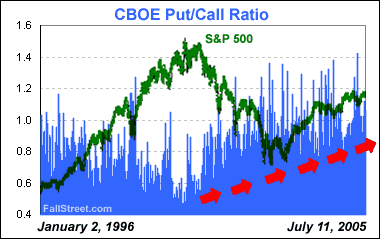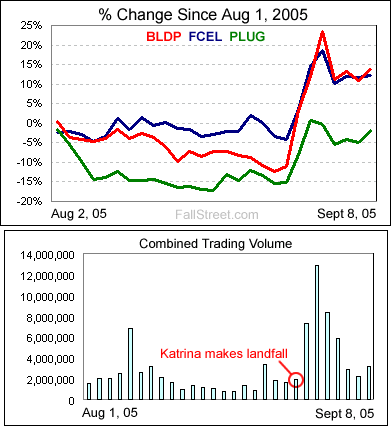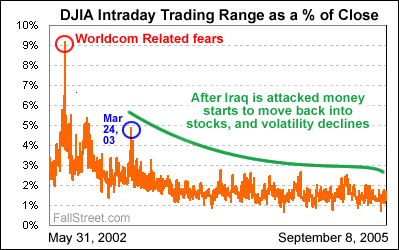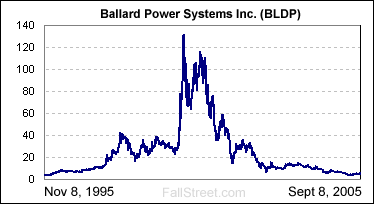|
|
|
|
September 9, 2005 |
||||
|
Last week US stocks supposedly benefited from the expectation that the impact of Hurricane Katrina would force the Fed to stop raising interest rates (largely because of the belief that rising energy prices would slow the US economy). This week stocks have supposedly rallied because of a decline in crude prices. Rather than lament on the obvious – that with expectations of a Fed rate hike later this month on the rise this week the analysis given by the mainstream press to describe stock market movements has been contradictory – lets just say that it is surprising that the three major US equity indices closed at higher levels yesterday than they did before Katrina struck.
Given that each of the above companies was carrying a large short position as of August 10 (FCEL was the highest at 14.2% of its float short), it is logical to assume that the rally in fuel cell companies was embellished by short covering. For that matter, given that the NYSE reported record short selling in its latest report, it highly probable that the rally in the broader market was, like the rally in fuel cell companies, at least partially supported by short covering (that no serious market fallout materialized following one of the worst disasters in US history would be enough to spook any short). In short, beyond the surge in gas prices following Katrina, there has been no news to suggest that a new energy paradigm is near. A Contrarian Look At Liquidity $433.82 billion has rolled into stock mutual funds and $311 billion has been siphoned out of money market funds since April 2003 (ICI). As is evident by the decline in the VIX, month after month of equity inflows has had a calming effect on the markets.
As far as the liquidity situation is concerned, the above numbers do not comment on the growing clout of hedge funds, the increasing amount of NYSE activity that is being controlled by program trades, and the impact of stock repurchases/insider sales. However, what the above numbers do is form a basis for extrapolation and speculation: more than 70% of the new money moving into stock mutual funds since April 2003 can be seen as coming directly from money market funds. Why is this factoid important? Because there is already evidence of increased investor interest for money market related investments, and with another rate hike from the Fed expected this should send the average money market yield above 3%. This suggests that the 30-month trend of money market outflows/equity inflows is close to an end. Katrina Does Not Change Dreary Stock Market Outlook Despite the wave of fantastic speculation Katrina has unleashed in specific stocks/industries, a Hurricane disaster does not provide investors with a new incentive to own stocks. Rather, with the liquidity outlook for stocks worsening with every Fed rate hike and other worries (i.e. high energy prices, possible curve inversion and a dollar crisis), not at threat of vanishing in the near term, the financial benefits acquired by specific companies in the rebuilding process can not be regarded as extremely significant. Quite frankly, that Halliburton and others will see an increase in profits does not outweigh the fact that the CBO estimates that up to 400,000 jobs were lost because of Katrina, and that capital is/will be funneled into rebuilding projects that will in many cases not yield an immediate return. That said, what Katrina has done is give stock market short sellers pause, and it will likely take some solid evidence of economic/earnings slow down before bruised short sellers attempt to reenter the market aggressively For bears hoping for a September washout this news is potentially disappointing. Yesterday Ballard signed a supply agreement with a lift-truck company, and BLDP shares surged by more than 13% after hours. Strength in BLDP shares allow the company to float more shares and keep the dream alive; a dream, ironically enough, that the destruction of Hurricane Katrina has helped rekindle.
I mention BLDP again because no matter how high its share price soars it does not necessarily mean that the underlying company is worth the price of admission. Rather, positive liquidity trends have been controlling the markets since Iraq was first attacked, and positive liquidity trends will continue to control the markets until an alternative to equities emerges for investors and/or another period of financial destruction similar to 2001/2002 arrives. Until these liquidity trends are reversed the US stock markets remain in high rotation mode, and short sellers will remain frustrated - even if the broader market fails to mount any serious rally. As for the media’s fixation on the price of oil as being the culprit behind every move in the stock markets, not only does the lack of volatility in stocks this year make it difficult to provide any analysis on daily price movements, it should be remembered that oil is dramatically higher year-over-year and yet stocks have not fallen. Why does a $5 jump in oil drag the Dow down 50 points one day (the largest daily loss for the Dow since Katrina hit) and a $3 decline in oil the next day spark a 100+ point Dow rally? Because oil has very little to do with the price action in stocks. Positive liquidity since 2003… BWillett@fallstreet.com |
||||
 |
||
 |
||


